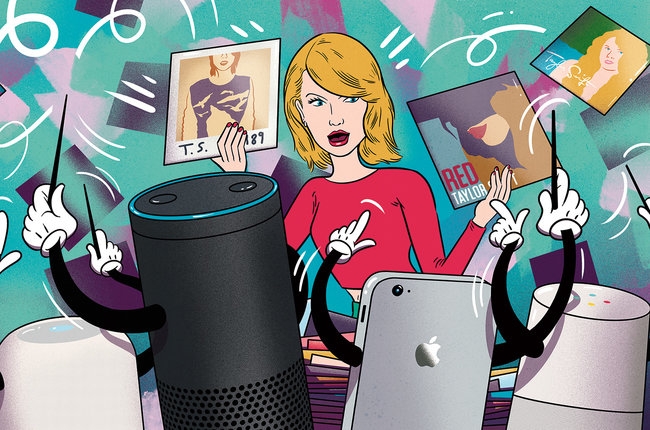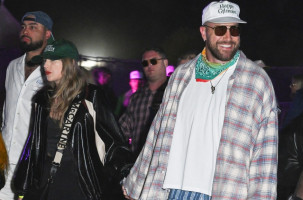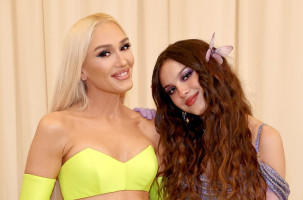Recently, Sony Music Entertainment assembled a six-person squad to crack what is shaping up to be one of the biggest challenges and opportunities for the music industry in decades. The task: getting voice-activated speakers to play certain tunes when living-room listeners call out anything from the name of their favorite band, to more nebulous requests that Amazon has fielded recently from its Echo users, such as "dog music," "drinking music," "pop music for yoga" or "Bruce."
"You've got to think about the way people would be requesting things," a Sony executive says, adding that a command to "play Bruce" raises the question of whether the speaker will produce the more popular Bruce (Springsteen), or perhaps Bruce Hornsby, who, Amazon reps say, could potentially elbow Springsteen out of the way if he dropped a hot new track. The Sony executive says the musical asks now emanating from Amazon's estimated 11 million Echo speaker owners include a lot of "curveballs and things none of us could have anticipated."
The Echo, along with Google Home and Apple's just-announced HomePod, are promising to supercharge the music industry's nascent growth, which until now has been fueled by such fast-expanding streaming services as Spotify and Apple Music. While Amazon Music Unlimited, Amazon's paid subscription service tied to its Echo speakers, has likely racked up only a few million paying subscribers since it launched in October, according to MusicWatch analyst Russ Crupnick, label executives say the voice-activated speaker explosion is radically changing consumption behavior. Fans are listening to music in their homes again with speakers as opposed to using headphones or earbuds, while older listeners are firing up streaming services without having to fumble for their reading glasses to search their phones. Amazon Music Unlimited, which is less than half the price of Spotify and Apple Music when bundled with an Echo, serves an older generation that the industry is keen on converting to paid streaming, given its comfort with paying for music. And voice-activated speakers in cars will make it easier to use on-demand music services on the road, potentially revving up further subscriptions.
But even the simplest of requests for the Echo's robotic assistant Alexa, such as "Play Taylor Swift," represents a complicated riddle for the record business. Which Swift song will Alexa play? How can Swift's distributor, Universal Music Group (UMG), make sure Alexa plays Swift's new single, or even a song from her latest album?
To cope, labels have been rearranging their marketing and tech staffs while improving metadata, the invisible information embedded in digital tracks containing details like artist, song title and genre. Because they're not typing or texting, users can be imprecise in requesting songs, artists or fragments of barely remembered lyrics, and labels are grappling with how they can exploit these half-baked commands.
"You have an opportunity to summon music based on fragments of a situation: 'Play the song about how it never rains in California,' and Alexa's going to find that Albert Hammond song," says Michael Nash, executive vp digital strategy at UMG, which is reorganizing its catalog to respond to Amazon's user data. If people request songs based on moods or the name of a lead guitarist, UMG wants to be at the top of those results, says Nash.
"When someone has a query like, 'I'm looking for rock songs from the '80s with a female vocalist for a running playlist,' that is six or seven bits of metadata," says Miles Galliford, founder/CEO of Beetroot, a U.K. startup that compiles metadata for music companies. He notes that the voice boom has boosted his business considerably during the past 12-18 months. "The challenge for the industry is to go into that back catalog and add that metadata, which is a big job. Without it, [the song] won't get found."
Warner Music Group has also beefed up its team to deal with the task, hiring longtime UMG digital exec Vinnie Freda as its chief data officer last December.
Like most of the top streaming services, Amazon has a staff of curators who specialize in every genre, led by Alex Luke, a former EMI and Apple digital music specialist.
Amazon Music vice president Steve Boom won't give away Alexa-Echo voice-command secrets, like which song plays when a customer requests "songs from the '80s," but he says the results revolve around "popularity and relevance to the consumer." The service emphasizes new music, so the album ÷ is likely to come up before catalog in a "play Ed Sheeran" request, although Music Unlimited gradually adapts to those who primarily listen to older music. "You can see velocity in terms of plays and songs," says Boom.
Ben Shepherd, Amazon's head of music services for Alexa, adds that the system is designed to study customers' requests based on certain criteria, such as artist, song title, date, genre and region. "We'll see patterns," he says. "It'll be different per customer as the system gets more personalized."
Label reps have been regularly meeting with Amazon officials, particularly Boom, to figure out how to promote and market music in the voice-activated world. John Mayer, Lady Gaga and Elton John have participated in Music Unlimited's Song of the Day promotions, in which artists play their own songs as well as influences and new favorites. One major-label source says Amazon promotions are highly desirable because they efficiently reach CD, streaming, download and voice customers: "That's a great opportunity to get exposure to all the different types of consumer bases."
It's too early to say how much voice-activated speakers will contribute compared to overall streaming, which created $2.5 billion in U.S. revenue in 2016, according to the RIAA. But it's beginning to register: In January, Ford rolled out Fusions and F-150s with Echos, and Sonos announced a streaming partnership with Amazon last August and plans to integrate voice this year.
"The industry should get ready for streaming services to go even more mainstream -- voice is such an intuitive interaction model, and that's what the industry needs to realize," says Google hardware head of business development Shanna Prevé. "Everybody's trying to tackle [voice]," adds Sonos partnerships director Ryan Taylor. "We're not caught up in some argument about file formats and legacy technology -- it's about how you are making sure you're prepared for all these amazing things that are going to happen in the next three years."








